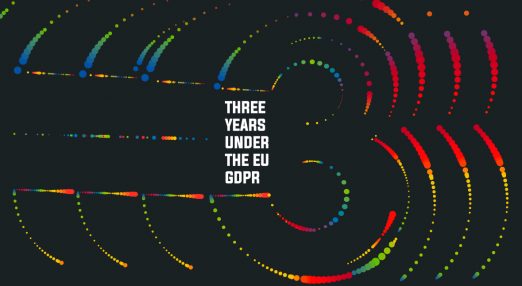IuRe teams up with journalist to sue the Czech state for mobile phone data collection
The Czech state has been collecting data on the mobile communications of all its citizens. While the content of the communication remains unknown, other types of data are stored for six months through telecommunication operators. The stored data includes information on phone traffic and the locations of the internet connection. However, according to EDRi's member Iuridicum Remedium (IuRe), such large-scale data collection conflicts with European legislation. Therefore, together with investigative journalist Jan Cibulka, it has decided to sue the Czech state and demand an apology for illegal data collection.
Filter resources
-

IuRe teams up with journalist to sue the Czech state for mobile phone data collection
The Czech state has been collecting data on the mobile communications of all its citizens. While the content of the communication remains unknown, other types of data are stored for six months through telecommunication operators. The stored data includes information on phone traffic and the locations of the internet connection. However, according to EDRi's member Iuridicum Remedium (IuRe), such large-scale data collection conflicts with European legislation. Therefore, together with investigative journalist Jan Cibulka, it has decided to sue the Czech state and demand an apology for illegal data collection.
Read more
-

Panoptykon ends campaign against uncontrolled surveillance reaching 3M people
1 out of 5 Poles are aware of the constantly growing powers of the Polish secret service. And this lack of knowledge from the public leaves the door open for further expansion of the powers of secret service authorities.
Read more
-

The urgent need to #reclaimyourface
The rise of automated video surveillance is often touted as a quick, easy, and efficient solution to complex societal problems. In reality, roll-outs of facial recognition and other biometric mass surveillance tools constitute a systematic invasion into people’s fundamental rights to privacy and data protection. Like with uses of toxic chemicals, these toxic uses of biometric surveillance technologies need to be banned across Europe.
Read more
-

GDPR: Three years in, and its future and success are still up in the air
The EU’s General Data Protection Regulation (GDPR) is not living up to the hype. When first implemented in 2018, the GDPR was presented as the new world standard for privacy and data protection. The law has increased data protection awareness and led to significant legal changes all over the world. Yet EDRi member Access Now’s new report, Three years under the GDPR: An implementation progress report, explores just how far this legislation still has to go before its promises — and potential — are truly fulfilled.
Read more
-

Transparency for institutions, privacy for the people
Much has been said about abuses of personal data by platforms like Facebook and other private companies. However, there is little observation of non-compliance by public administrations or institutions such as the policies undermining the privacy of the public and the small (or large) daily abuses people are subject to.
Read more
-

European Court on Human Rights Bought Spy Agencies’ Spin on Mass Surveillance
For good or ill, and I believe for ill more than for good, with the present judgment the Strasbourg Court has just opened the gates for an electronic “Big Brother” in Europe. EDRi's member Electronic Frontier Foundation (EFF) discusses the recent European Court on Human Rights' decision that the British and Swedish surveillance regimes violate privacy.
Read more
-

UK: European Court decision in Big Brother Watch case does not go far enough to protect free expression and privacy
The finding of a violation is testimony to the doggedness of civil society in holding the UK government to account in the wake of the Snowden revelations about mass surveillance programmes. EDRI's member ARTICLE 19 welcomes the decision of the European Court of Human Rights (European Court) in Big Brother and others vs the UK, which ruled that the United Kingdom’s bulk interception of communications violated the right to privacy and failed to protect journalists in breach of the right to freedom of expression.
Read more
-

Human rights groups win European Court of Human Rights claim on UK mass surveillance regime
Eight year legal battle against UK mass surveillance programmes exposed by whistleblower Edward Snowden culminates in victory for privacy. EDRi's member Privacy International worked actively to make this happen.
Read more
-

Antiterrorists in a bike shed – policy and politics of the Terrorist Content Regulation
The short story: an ill-fated law with dubious evidence base, targeting an important modern problem with poorly chosen measures, goes through an exhausting legislative process to be adopted without proper democratic scrutiny due to a procedural peculiarity. How did we manage to end up in this mess? And what does it tell us about the power of agenda setting the name of the “do something” doctrine?
Read more
-

Spotify, don’t spy: global coalition of 180+ musicians and human rights groups take a stand against speech-recognition technology
“You can’t rock out when you’re under constant corporate surveillance. Spotify needs to drop this right now and do right by musicians, music fans, and all music workers.” - Tom Morello
Read more
-

“E-evidence” negotiations: a call to protect media freedoms and democratic rights from abusive cross-border orders
Together with a coalition of 25 organisations and companies, European Digital Rights (EDRi) urges the European Parliament and the Council to uphold a high level of procedural safeguards in their negotiations on the so-called “e-evidence Regulation”.
Read more
-

Washed in blue: living lab Digital Perimeter in Amsterdam
An increasing amount of Dutch government agencies seem to resort to so-called ‘living labs’ and ‘field labs’ in order to test and experiment with technological innovations in a realistic setting. In recent years, these live laboratories have proven to be a useful stepping stone to introduce new technologies into public space. In the last several weeks, EDRi's member Bits of Freedom took a closer look at one of those living labs – the so-called Digital Perimeter surrounding the Johan Cruijff ArenA in Amsterdam – and were not pleased with what they saw.
Read more
